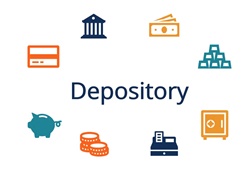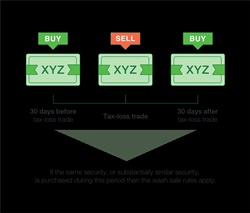
Table of Contents
Defining Depository
A Depository refers to an entity or a place (mainly an office, building, or warehouse) that holds the financial securities, including money and other valuable Financial Assets, in a dematerialized way.

Depository Banks
Depositories help in eliminating the risks of holding essential physical assets to owners. For example, banks and other financial institutes offer consumers a chance to deposit securities on-demand in a time or Demand Deposit account and withdraw them whenever required.
The time deposit refers to an account that bears the interest and has a maturity date, like the Certificate of Deposit (CD). On the other hand, demand deposit accounts hold funds until you wish to withdraw them, like savings or checking accounts.
Depository in Stock Market
Deposits might also be made in the form of securities, like Bonds or stocks. While depositing these assets, the institution holds the security electronically, and this is also called the book-entry form. It can also be in paper or the dematerialized format, like the physical certificates.
Need of a Depository
They serve numerous purposes for the general public. Customers can give money to the financial institution, believing that it will hold the funds and give it back to the customer when required.
The depositories accept the money of customers and pay interest on the deposits for a certain period. A depository ensures higher security and liquidity in the Market and uses the deposited money for safekeeping to lend others, invest in securities, and offer a transfer system for funds. However, upon request, the depository must return the deposit in the exact condition as deposited.
Talk to our investment specialist
Depository Services
- Bridging the gap between investors or shareholders and the public companies:
A depository acts as the connection between public firms that issue financial securities and shareholders or investors. The agents associated with depositories issue securities, and these agents are called the depository participants. They must transfer securities from depositories to investors. Any institution, Bank, or brokerage can be a depository participant.
- Eliminating the risks involved with owning the physical form of financial securities:
A depository allows investors and traders to hold the dematerialized form of securities and thus, eliminates risks involved with holding the physical form of financial securities. Buyers and sellers are not required to check if the securities got successfully transferred without any theft or losses. The depository system reduces such risks by allowing the holding and transferring of securities electronically.
- Allowing loans or mortgages to the interested parties:
The depositories hold customers’ securities and return them when they want. The customer receives interest on the deposits. In contrast, the depositories earn more interest by lending the same deposits to other needy people or businesses as the loans or the mortgages.
Reducing paperwork and quickening the process for security transfers: During a trade, a depository transfers the securities’ ownership from one investor to the other. It helps reduce complicated paperwork for trade finalization and speeds up the process to transfer securities.
Types of Depositories
Here are three vital categories of depository institutions:
1. Commercial Banks
These are mainly for-profit organizations and are owned by private investors. They offer a Range of services, varying according to the banks’ sizes. The smaller banks offer limited services, including consumer banking, smaller loans, mortgages, small-business banking, etc. For the smaller banks, the market range is also limited. In contrast, the larger and global banks offer more services, including foreign exchange, investment banking, and money management. Sometimes, they might also offer services for other more prominent organizations and banks. Services offered by the large banks are more diverse among all the other depositories.
2. Credit Unions
These are the financial cooperatives owned by the members of certain groups. Profits earned by these depositories are either received by their members as dividends or reinvested into the organization. Credit Union members own the institutional accounts; thus, the depositors also become the partial owners and are eligible to receive the dividends. As credit unions are nonprofit institutions, they are not required to pay any state tax. Hence, there is a lower interest change in this case, and they pay higher rates on deposits.
3. Savings institutions
Banks serving the loan institutions and local communities are the savings institutions. The residents are the ones depositing money in the bank which then gets offered back as mortgages, credit cards, consumer loans, and other loans for small businesses. These might be set up as financial cooperatives or corporations to allow depositors to get the organization’s ownership shares.
All efforts have been made to ensure the information provided here is accurate. However, no guarantees are made regarding correctness of data. Please verify with scheme information document before making any investment.











